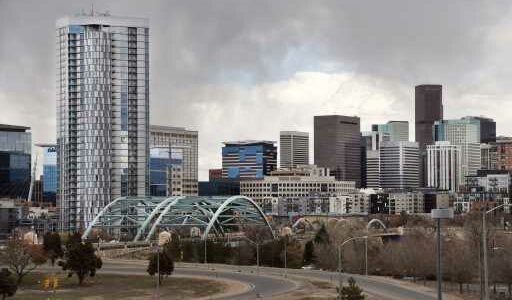
Colorado’s economy growing but slowing as the hiring rate declines
Growing but slowing is how a new report describes Colorado’s economy. The state’s 1.2% growth in employment in March was the country’s second-lowest, just behind West Virginia, and the state’s slowest since late 2021.
Although revised numbers are expected to nudge the growth rate up, possibly to about 2%, Colorado will likely rise to only the 40th spot nationally in terms of new jobs, said Brian Lewandowski, executive director of research at the University of Colorado-Boulder’s Leeds School of Business.
However, the quarterly report on economic indicators released Thursday by the Colorado secretary of state’s office also showed a record number of new business filings. And Lewandowski said Colorado was one of only nine states to report an increase in job openings.
“Even though we have a slowing employment growth rate, we still have a very high number of job openings in the state,” Lewandowski said.
Colorado’s high rate of participation in the labor force and a record number of new business filings were cited as positive signs even while expansion of the national gross domestic product slows and worries remain about the health of the nation’s banking system after recent bank failures.
Filings for new businesses totaled nearly 56,000 in the first three months of the year. Filings jumped 27.6% year over year and 14.3% increase from the previous month.
“We’re growing but slowing. Employment was up quarter over quarter. It’s a strong start to 2023 and our report indicates employment will continue to grow,” Secretary of State Jena Griswold said.
Filings have been buoyed in part by a cut in fees from $50 to $1. The reduction will end later this year when the $8.4 million allocated by the legislature to lower the filing fees runs out.
Business-dissolution filings increased 19% from year to year.
Lewandowski said Colorado’s “air of innovation of entrepreneurship” is a strength for the state, but the slowdown in the growth of employment signals a weakness. He is watching what happens with the high-tech industry, which has made layoffs nationally, and the business and professional services sector.
For now, consumer spending appears to be keeping the economy aloft despite the headwinds of higher interest rates and inflation. Lewandowski said the national GDP was projected at about 2.5 for the first quarter but slumped to 1.1% while consumer spending rose 3.7%. He said consumption accounts for 70% of GDP.
Robust consumer spending, driven by growth in hiring, “sort of keeps us between slow growth and light recession,” Lewandowski said.
While job growth has slowed in Colorado, the number of job openings is still high. Lewandowski said there are 2.4 job openings in Colorado for every unemployed person. The national rate is 1.6 job openings.
Colorado’s labor participation level of 68.5% is the fourth-highest in the country. The rate measures how actively working-age adults are working or looking for work.
The state’s unemployment rate declined from 2.9% in February to 2.8% in March 2023. The U.S. unemployment rate was 3.5% in March.
“Even though we have a slowing employment growth rate, we still have very high number of job openings in the state, a demand for workers and a growing workforce, all very good news,” Lewandowski said.
Griswold and Lewandowski said the seeming contradictions between the slower growth rate in employment and high job openings are likely due in part to drops in population. Griswold said Denver, Boulder, Jefferson and Arapahoe counties lost a combined 34,000 residents over the past two years, according to counts from the U.S. Census Bureau.
Douglas, Weld and Larimer counties gained population Griswold added.
Denver County’s population was down 0.3% during those two years, according to a study by the Economic Innovation Group.
People moving to Colorado have helped expand the state’s workforce for a while, said Richard Wobbekind, CU-Boulder’s senior economist and faculty director of the Leeds Business Research Division.
“The increase in job openings is still a very positive thing. We just don’t have the workforce to fill them,” Wobbekind said.
High housing, child care and health costs affect “the people who are willing to take jobs in the state of Colorado,” Griswold said.
Jobs in mining and logging grew the fastest in Colorado during the first three months this year. The sector, made up mostly of oil and gas jobs, grew by 5.4% to a total of 21,600 positions.
Griswold and the university economists said they continue to pay attention to the state’s banks and whether the troubles that recently forced three banks in other states to close might be spreading.
“Banks are being more cautious about making loans, so that could really slow down small businesses in particular,” Wobbekind said.
Despite the problems, Wobbekind doesn’t expect the kind of financial crisis that erupted in 2008, kicking off the Great Recession.
“The banking system in general is in better shape,” Wobbekind said. “This is not going to be a broad-based bank crisis by any means.”
Get more business news by signing up for our Economy Now newsletter.
Source: Read Full Article